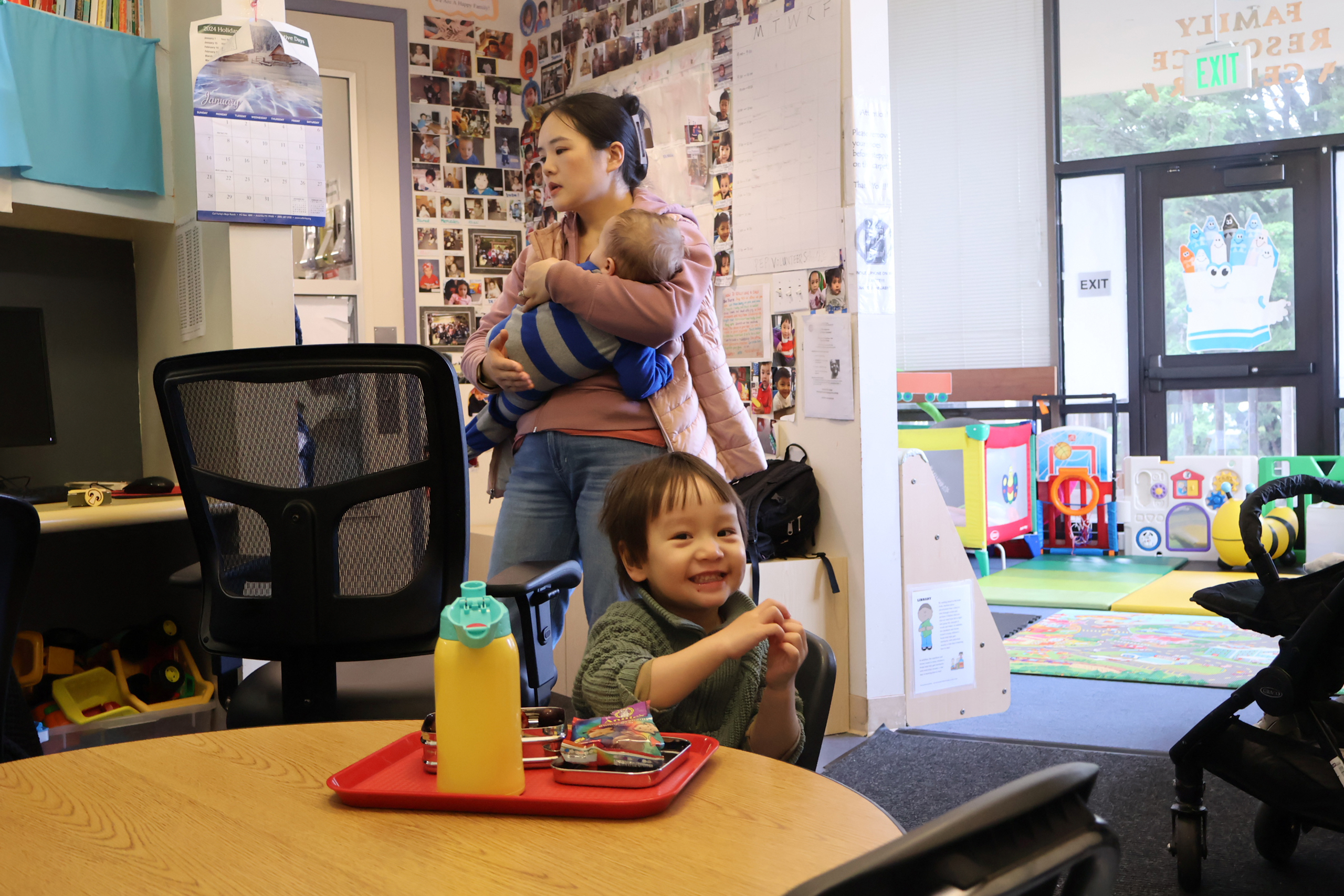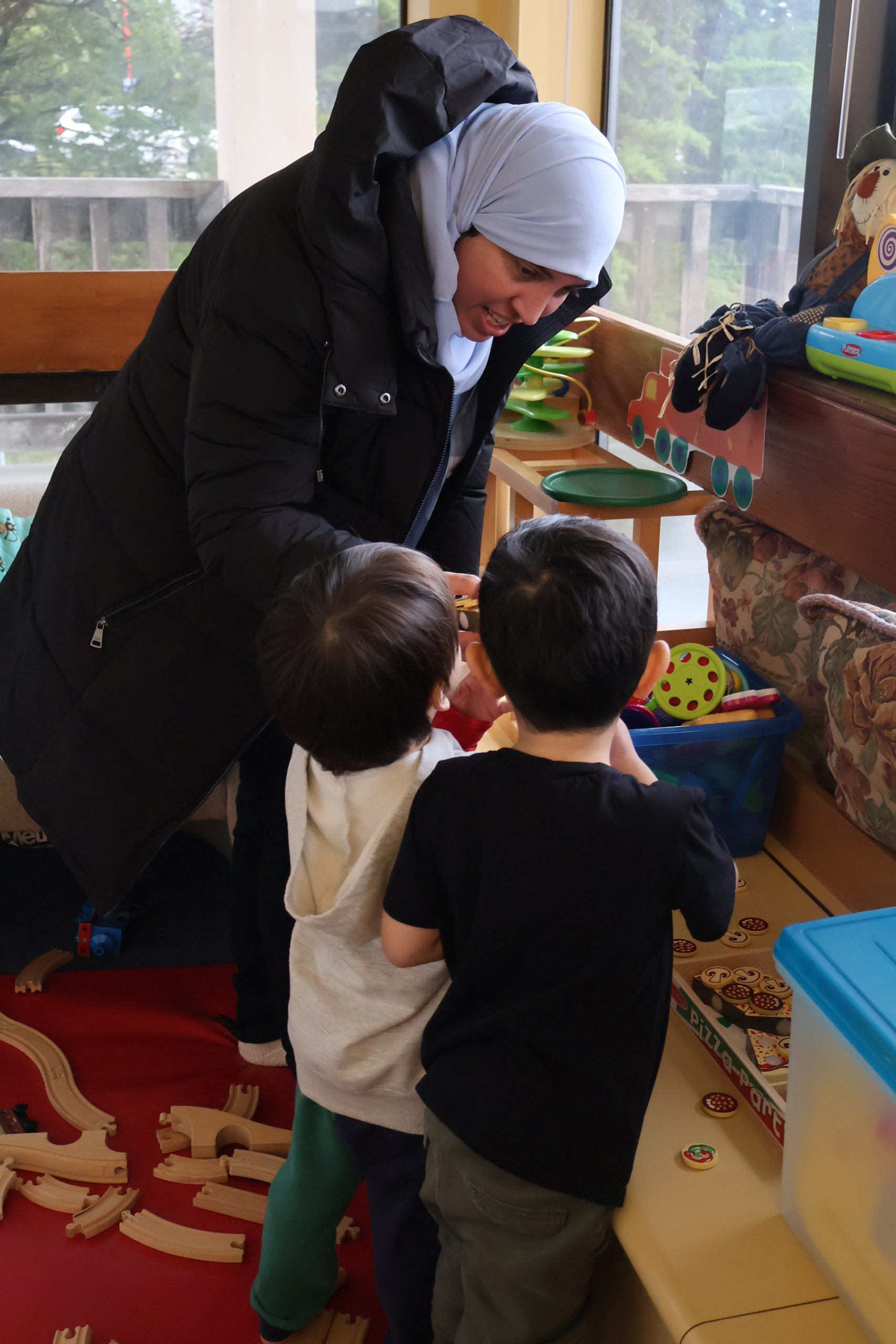Family Resource Center Coordinator Works to Improve Program Despite Challenges
By Elena Chiaruttini
echiarut@mail.ccsf.edu
If you happen to wander around the Student Union on City College’s Ocean Campus, sometimes you’ll notice babies and toddlers, accompanied by their grown-ups, on their way to Room 201. That’s where the Dr. Betty Shabazz Family Resource Center (FRC) is located. It’s a safe space that provides key support for City College student parents. However, it’s not as simple as it looks.
Despite providing key support for student parents today, many of them had to speak up for their rights to make it happen.
“Why does it always need to be a fight?” Tracey Faulkner sighed, allowing herself to have a moment of discouragement. Faulkner has been the FRC’s coordinator since 2003, and was one of the founders of the program. Every morning, she walks into the FRC office to work for equal opportunities.
Faulkner was the driving force that made those walls get built. She has been fighting for the rights of student parents since she was a City College single mom on welfare herself. “It’s a long story,” she said with a laugh.
It was 1996 when then President Bill Clinton’s welfare form passed, requiring parents to wait for childcare until their kids were 2.9 years old.
“Luckily, someone told me about it when my daughter was under one year old,” Faulkner said, since the waiting list was ridiculously long. “My daughter’s name came up when she was almost three. I had to potty train her in two weeks. I did a lot of laundry.”
Finally with childcare, Faulkner was encouraged by her mother to return to school, deciding to pursue an Early Childhood Education degree at City College.
“I got my daughter into childcare on campus which was really helpful,” she said.
However, not long after that the Federal Welfare Reform Act changed things again.To keep their benefits, the student parents were suddenly told to quit school and go to work for 32 hours a week.
“I would have had to stick with the job they provided me, which was for $490 a month. I was supposed to pay for rent and everything.”
At that point, Faulkner and other student parents on welfare started talking about the unfairness of the situation.
“We started saying we needed to find a resource center for childcare,” Faulkner said. It took months and determination, but it turned out to be more than worth it. “The Associated Students gave us $15,000 to start.”
“This space, here,” Faulkner said, opening her arms gesturing towards the office, “was completely open.” The nonprofit Christmas In April volunteered to build the center in 1998. “They literally built these walls for us. It was amazing.”
“We ended up becoming a task force that created this program,” she said. The newly founded FRC was given a licensed childcare provider from the Childcare Development Department, receiving the funding from the Chancellor to do so.
However, the founders soon realized they would all leave the campus eventually.
“Several of us were going to State University because, you know, especially after what we made possible, we all felt empowered and ready to get our BAs. But there was no leader behind us,” Faulkner said.
So, they created the position that Faulkner holds today to ensure the program remained student-focused. Faulkner left to get her Bachelor’s degree at San Francisco State University (SFSU) in Childcare Education, but was back in charge in 2003.
Since January 1999, the FRC has reached great achievements, despite facing challenges through the decades.

Photo by Elena Chiaruttini/The Guardsman.
The 2008 economic downturn followed by the accreditation crisis of 2012 inevitably affected the program. Its budget, never enough to serve all of the families in need on campus, was reduced drastically.
“We lost our childcare provider in 2008, we didn’t have the budget for that anymore. It took me a year to get a provider back,” Faulkner said.
Going through those difficult times made Faulkner realize how fragile the program was. Because of that, she decided to go back to SFSU to get her Master’s degree in Early Childhood Education.
The COVID-19 pandemic presented another big challenge. However, the response of FRC was surprisingly resourceful and well-organized.
“We rocked with our virtual programming! And it was noticed that we did,” Faulkner said. The FRC organized many workshops, including ones on self-care and combating Asian hate. “We still had food carts and searched everywhere for resources, workshops in different languages, we still had our student parents advisory meetings,” Faulkner said.
In that same period, the FRC also started contacting community partners such as the Pregnant Scholar Program and informed all its student parents on federal rights.
“We acknowledged the rights provided by Title IX, which is better known to cover sexual harassment issues,” Faulkner said. “It actually covers anything to do with gender, including rights as pregnant parenting students, gender identity and women in athletics rights.”
The FRC then started to do workshops to educate the faculty on the student parents’ Title IX rights, where students could talk about their experiences in general and during the pandemic.
“It’s also important to us having peer mentors, students within the staff who speak different languages,” Faulkner said. “We have Arabic, Catanese, Mandarin and Spanish currently spoken here.”
The program is constantly working to improve and fight for the rights of students.
“We got student parents priority registration, just last May,” Faulkner said, “And we are working on a web page for student parents because I want them to have their rights clear.”
And yet, the program’s problems haven’t ended. Budget struggles and discrimination are still ongoing.
Last semester alone, the FRC served 400 student parents, who actually walked through the door. According to Faulkner, there are around 4,0000 student parents on campus. She knows that the department doesn’t have the capacity and budget to serve them all.
Faulkner says that, weirdly, there is still a lot of prejudice towards student parents. “You know, you’re a parent so it’s kinda your fault. There is still a lot of that attitude.”
Faulkner vividly remembers an episode happening two semesters ago. A student parent came into the office crying one day, because of the way she was treated by the faculty.
The student had a job in the Civic Center. Because of San Francisco’s traffic, she arrived late to class two times in a row. The third time, she arrived at class less than 10 minutes late. They had a test that day, and she was so proud she made it. Yet, she received an email from her instructor, saying she should ‘evaluate her priorities’.
“You know, it’s stuff like this that makes people give up,” Faulkner said.
“Student parents have the same problems as regular students, plus kids. If the parents are going through some problems, their kids are going through that too,” she said. The program is sensitive to issues of discrimination and fights them daily.
Faulkner says that on top of the sexism that most women within the program face, there are other barriers and systemic issues, such as racism, homophobia, transphobia, xenophobia. “If you are a parent, it is even harder. As parents, we want to protect our kids from those issues.”
Another injustice Faulkner has to deal with is regarding her position in the program. Despite having the responsibilities of the program manager of FRC, her title has always been ‘School Aide Assistant’.
“I make half the money of the other program managers here at City College for doing the same job. It’s always been like that because, at the beginning, we didn’t know any better. We were told that was what the campus could offer us,” Faulkner said.
Faulkner has been trying to receive proper compensation for her work, and change her title since 2018, when she found out how things work for the rest of the departments. However, nothing has changed so far.
“I said ‘Wait a minute here, this is not fair,’” Faulkner said. “The work we do, the amount of students we take care of, and they just treat it like it’s a lifestyle choice or something.”
Despite her work being undervalued by the college, students who are benefiting from the FRC are full of praise.
“The program has had a tremendous impact on my life,” Leticia Arce said. Arce is a student parent who joined the program in Fall 2022, when her baby was about to turn one year old.
She decided to go back to study, supported by her husband, who’s currently the only provider of their family after that decision. Arce is also able to find time to study thanks to the Drop-In program, which allows student parents to have childcare for a maximum of four hours a day while they study in the same building.
“It’s such a supporting space. I know I can count on trusting people to look over my baby Miguelito when I go to class,” Arce said. “He can interact with other kids and I’ve found a wonderful community among fellow student parents.”
Arce only has one class left to take this semester, microbiology, to complete the prerequisites to take a Master’s in nursing.
In a couple of years, the benefits of the Drop-In program will be even more valuable when all the departments that serve students will be moved into the new Student Success Center. This way, student parents could take advantage of counseling and tutoring during the Drop-In hours.

Student Trustee Heather Brandt, who has previously held other leadership roles such as City CollegeStudent Chancellor and President of the Associated Students Council of Ocean Campus (ASCO), discovered the program in 2014.
“If I had known about the FRC earlier, when I had only one child, I would have gotten into my education a lot sooner,” Brandt said. “Having childcare here and through the preschool program offered beyond the FRC, was a game changer for me.”
She never left, starting to actively help the program as a student worker in 2017, fighting for the rights of student parents and budget barriers along with Faulkner.
For the future, Faulkner also hopes the program will expand further, having more people on staff. She also wishes the center could stay open from 8 a.m. to 5 p.m., instead of its current hours 9 a.m. to 3 p.m., “because [the current schedule] doesn’t serve students as much as we would like to,” she said.
Faulkner, who will turn 60 later this year, plans to soon hire someone she could train to ensure a smooth transition of leadership by the time she retires, that will probably be between the next 3 or 5 years.
“I want to make sure that this program is gonna be as strong when I leave,” Faulkner said. “Because, you know, I put too much heart in this place.”
